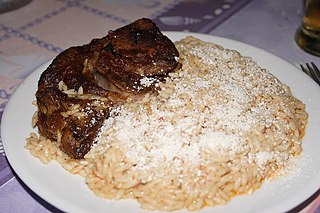
Greek cuisine is the cuisine of Greece and the Greek diaspora. In common with many other cuisines of the Mediterranean, it is founded on the triad of wheat, olive oil, and wine. It uses vegetables, olive oil, grains, fish, and meat, including pork, poultry, veal and beef, lamb, rabbit, and goat. Other important ingredients include pasta, cheeses, lemon juice, herbs, olives and olive oil, and yogurt. Bread made of wheat is ubiquitous; other grains, notably barley, are also used, especially for paximathia. Common dessert ingredients include nuts, honey, fruits, sesame, and filo pastries. It continues traditions from Ancient Greek and Byzantine cuisine, while incorporating Asian, Turkish, Balkan, and Italian influences.

Lasagna, also known as lasagne, is a type of pasta, possibly one of the oldest types, made in very wide, flat sheets. The same-named Italian dish is made of stacked layers of lasagna alternating with fillings such as ragù, béchamel sauce, vegetables, cheeses, and seasonings and spices. The dish may be topped with grated cheese, which becomes melted during baking. Typically cooked pasta is assembled with the other ingredients and then baked in an oven. The resulting baked pasta is cut into single-serving square or rectangular portions.

Moussaka is an eggplant (aubergine)- or potato-based dish, often including ground meat, which is common in the Balkans and the Middle East, with many local and regional variations.
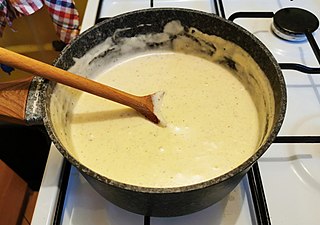
Béchamel sauce is one of the mother sauces of French cuisine.
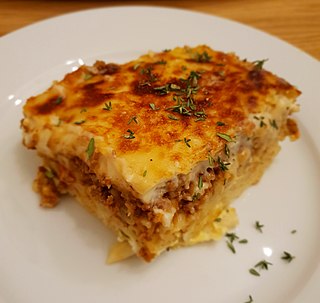
Pastitsio is a Greek baked pasta dish with ground meat and béchamel sauce, with variations of the dish found in other countries of the Mediterranean Sea.

Arab cuisine is the cuisine of the Arab world, defined as the various regional cuisines of the Arab people, spanning from the Maghreb to the Mashriq. These cuisines are centuries old and reflect the culture of trading in ingredients, spices, herbs, and commodities. The regions have many similarities, but also unique traditions. They have also been influenced by climate, cultivation, and mutual commerce.

Cypriot cuisine is the cuisine of the island of Cyprus, shared by both Greek Cypriots and Turkish Cypriots.
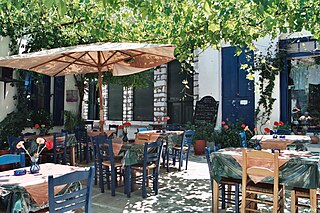
A taverna is a small Greek restaurant that serves Greek cuisine. The taverna is an integral part of Greek culture and has become familiar to people from other countries who visit Greece, as well as through the establishment of tavernes in countries such as the United States and Australia by expatriate Greeks.

Italian-American cuisine is a style of Italian cuisine adapted throughout the United States. Italian-American food has been shaped throughout history by various waves of immigrants and their descendants, called Italian Americans.
Bukharan Jewish cuisine is the traditional cuisine originating from the Bukharian Jewish community of Central Asia, who now mostly reside in Israel, and the United States.
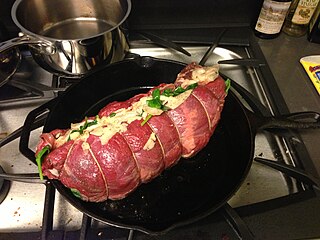
A roulade is a dish of filled rolled meat or pastry. Roulade can be savory or sweet. Swiss roll is an example of a sweet roulade. Traditionally found in various European cuisines, the term roulade originates from the French word rouler, meaning "to roll".

Tunisian cuisine, the cuisine of Tunisia, consists of the cooking traditions, ingredients, recipes and techniques developed in Tunisia since antiquity. It is mainly a blend of Mediterranean and native Punics-Berber cuisine. Historically, Tunisian cuisine witnessed influence and exchanges with many cultures and nations like Italians, Andalusians, French and Arabs.

The cuisine of Algeria is influenced by Algeria's interactions and exchanges with other cultures and nations over the centuries. It is based on both land and sea products. Conquests or demographic movement towards the Algerian territory were two of the main factors of exchanges between the different peoples and cultures. The culinary traditions of Algeria, like that of many North African countries, have influences from Amazigh, Andalusian, Arab, Ottoman, Mediterranean, and French cuisines.

Breaded cutlet or braised cutlet is a dish made from coating a cutlet of meat with breading or batter and either frying or baking it.
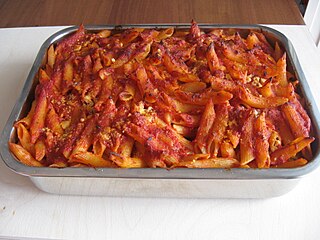
Pasta al forno or timballo di pasta is a typical dish of Italian cuisine, made of pasta covered with béchamel sauce, tomato sauce and cheese, and cooked in the oven.
















